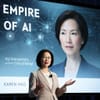The concept of an "AI empire" is becoming increasingly relevant as the AI industry continues to grow and shape the world. According to Karen Hao, author of "Empire of AI," the AI industry, particularly OpenAI, has grown into a powerful entity that resembles an empire. This empire is driven by the ideology of artificial general intelligence (AGI), which promises to benefit humanity but often prioritizes speed and growth over safety, efficiency, and exploratory research.
The pursuit of AGI has fueled the industry's exponential growth, massive resource demands, and willingness to release untested systems. However, this pursuit has also led to significant harms, including job loss, concentration of wealth, and AI chatbots that can fuel mental health crises. The massive infrastructure required for AI development has substantial environmental costs, and workers in developing countries have been exposed to disturbing content and paid low wages for roles like content moderation and data labeling.
Hao suggests that developing new techniques in algorithms and improving existing ones could reduce the amount of data and compute needed, prioritizing efficiency and safety over speed. She points to Google DeepMind's AlphaFold, a system trained on specific data that has made significant contributions to drug discovery and understanding disease without the same level of harm caused by more general AI systems.
The story of the AI empire is a complex one, and it's essential to consider the costs and consequences of our beliefs about AI. As we continue to develop and deploy AI systems, we must prioritize safety, efficiency, and responsibility to ensure that the benefits of AI are shared by all.


